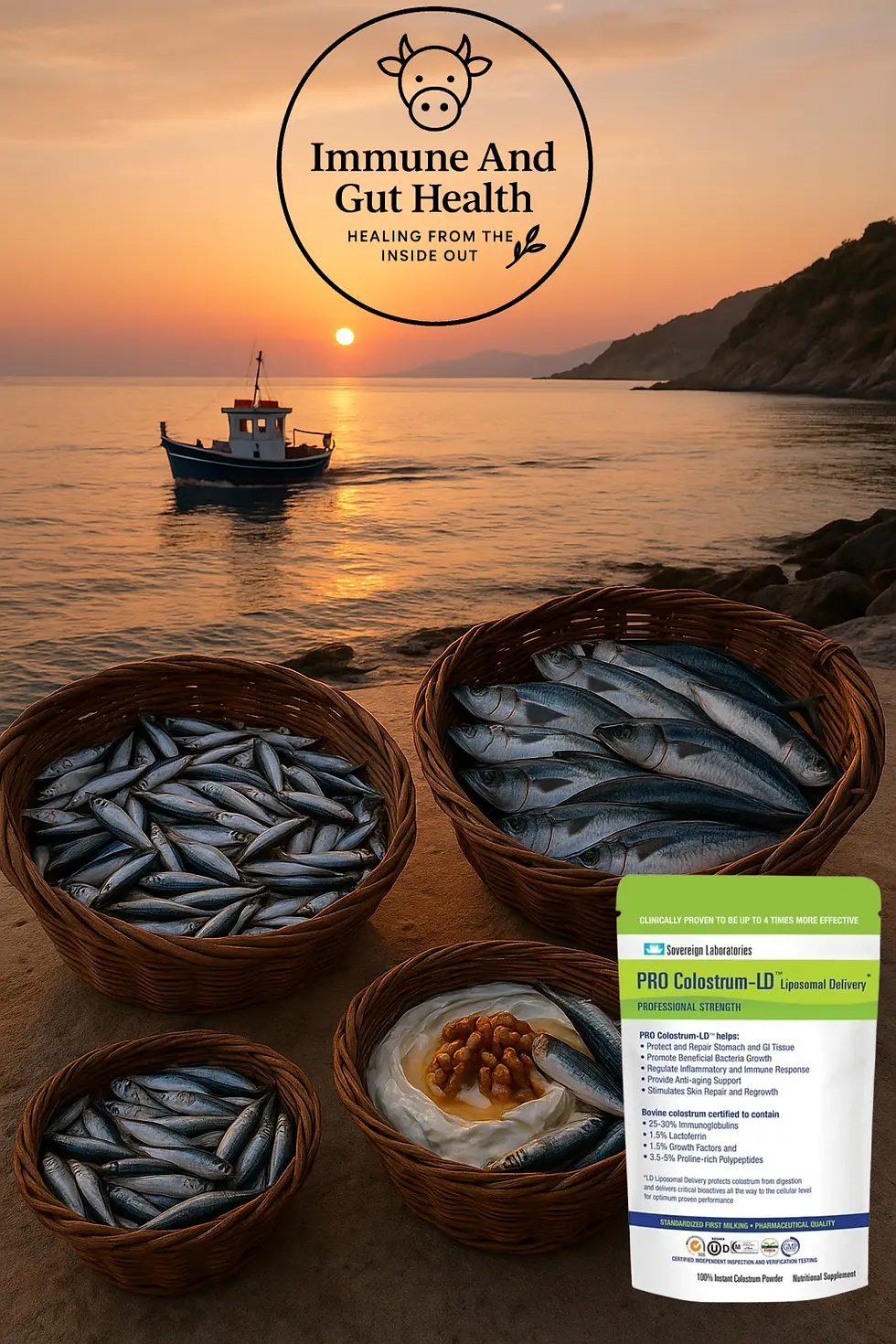Eat Like the Mediterranean, Think Like a Centenarian
- Gut Guru

- Aug 29, 2025
- 4 min read

How Omega-3s, Fresh Foods, Traditional Herbs, and ProColostrum LD Protect Your Gut and Brain
Meta Description (SEO): Discover how the Mediterranean diet — rich in seafood, Greek yogurt, honey, walnuts, herbs, and teas like mountain tea, Cistus, and Dittany of Crete — lowers inflammation, supports gut health, and protects your brain, especially when paired with ProColostrum LD.
Why Food is Brain Medicine
The Mediterranean diet isn’t just delicious — it’s one of the most studied and proven ways to reduce inflammation and protect brain health. People in Mediterranean regions live longer, stay sharper, and enjoy vibrant lives well into their later years.
I’ll be traveling to Ikaria, Greece, this October — a famous Blue Zone island where many inhabitants live to over 100 years. What’s their secret? They eat a traditional Mediterranean diet, keep moving well into their 90s, and celebrate life together through panagyria — festivals where entire villages dance late into the night.
It’s the perfect reminder of Blog 1: movement and joy are as essential as food when it comes to lowering inflammation and protecting the brain.
The Power of Seafood and Omega-3s
Fish like salmon, sardines, and mackerel are cornerstones of the Mediterranean table. They’re rich in omega-3 fatty acids (EPA and DHA), which:
• Calm neuroinflammation.
• Support memory and mood.
• Protect against cognitive decline and depression.
On Ikaria, seafood is a staple — often caught fresh that very morning. When you swap out processed meats for fish a few times a week, you’re feeding your brain with the raw materials it needs to thrive.
Greek Yogurt, Honey, and Walnuts: A Brain-Boosting Trio
Few foods are as symbolic — and synergistic — as this simple Mediterranean breakfast or dessert:
• Greek yogurt provides probiotics that enrich the gut microbiome.
• Honey is full of antioxidants and natural enzymes that calm inflammation.
• Walnuts (shaped like tiny brains!) are rich in omega-3s, polyphenols, and fiber.
Together, they create a gut-nourishing, brain-protecting powerhouse.
Fresh Salads, Herbs, and Dips — The Anti-Inflammatory Rainbow
In Mediterranean kitchens, vegetables are not a side dish — they’re the main attraction. Think:
• Raw salads and dips: tabbouleh, hummus, baba ghanoush, fresh tomato-cucumber salads.
• Herbs like oregano, basil, mint, and rosemary, each packed with anti-inflammatory phytochemicals.
• Olive oil as the foundation — rich in polyphenols that lower oxidative stress and soothe inflamed pathways in the brain.
Eating this way floods your body with antioxidants, fibers, and phytonutrients that calm inflammation at the root.

The Healing Herbs of Greece: Mountain Tea, Cistus & Dittany
The Mediterranean lifestyle isn’t just about food — it’s also about the healing herbs and teas that people sip daily.
• Greek Mountain Tea (Sideritis): Rich in flavonoids and polyphenols, it has anti-inflammatory, antioxidant, and neuroprotective effects. Studies suggest it may support memory and cognitive function, making it a true “brain tonic.”
• Cistus (Cystis) Tea: Traditionally used across Crete and the islands, Cistus is packed with antimicrobial and immune-strengthening compounds. It supports the gut, calms inflammation, and protects cells from oxidative stress.
• Dittany of Crete: A rare, ancient herb revered since Minoan times. Dittany has been used for digestive healing, antimicrobial defense, and tissue repair. Locals consider it a sacred herb for vitality and longevity.
These herbal teas don’t just warm the body — they calm inflammation, support gut health, and nourish the brain with centuries of traditional wisdom to back them up.
Gut Health: The Missing Piece of the Mediterranean Puzzle
Even the best diet can’t work its magic if your gut lining is compromised. A leaky gut allows inflammatory molecules to escape into the bloodstream, fueling the very processes that damage the brain.
That’s why I always say: gut repair is the foundation. Without it, even the healthiest foods can’t fully deliver their benefits.
ProColostrum LD: Amplifying the Mediterranean Diet
This is where ProColostrum LD shines. Packed with immunoglobulins, lactoferrin, and growth factors, it helps:
• Repair the gut lining, sealing leaks that drive systemic inflammation.
• Support a healthy microbiome, so probiotics from yogurt and fiber from plants can flourish.
• Enhance nutrient absorption, making omega-3s, antioxidants, herbs, and polyphenols even more effective.
Think of it this way: the Mediterranean diet and traditional herbs supply the building blocks, and ProColostrum LD lays the foundation so those blocks actually stay in place.
How to Put This Into Action Today
• Eat fish (salmon, sardines, or mackerel) 2–3 times per week.
• Enjoy Greek yogurt with honey and walnuts as a daily breakfast or snack.
• Load your plate with raw salads, herbs, and dips — more color, more antioxidants.
• Sip on mountain tea, Cistus, or Dittany of Crete instead of soda or packaged drinks.
• Use extra virgin olive oil as your main fat source.
• Take ProColostrum LD daily to support gut lining repair and amplify all the brain-protective benefits of the Mediterranean lifestyle.
• Don’t forget the Ikaria lesson: share meals, dance, and stay connected with community — joy itself is anti-inflammatory.
My Personal Invitation to You
When I started leaning into a Mediterranean-style way of eating — fresh fish, raw salads, Greek yogurt, walnuts, herbs, and healing teas — alongside daily ProColostrum LD, my brain fog began to lift. My gut felt calmer, my energy steadier, and my mood brighter.
On Ikaria, they don’t just eat well; they move daily, dance often, drink herbal teas, and celebrate life in community. That’s the true spirit of the Mediterranean lifestyle, and it’s available to all of us, no matter where we live.
✨ Next in this series: We’ll explore why sleep is your brain’s detox system, and how gut repair helps you get deeper, more restorative rest.
In the meantime, why not get started with some ProColostrum LD to heal your inner gut lining?













Comments